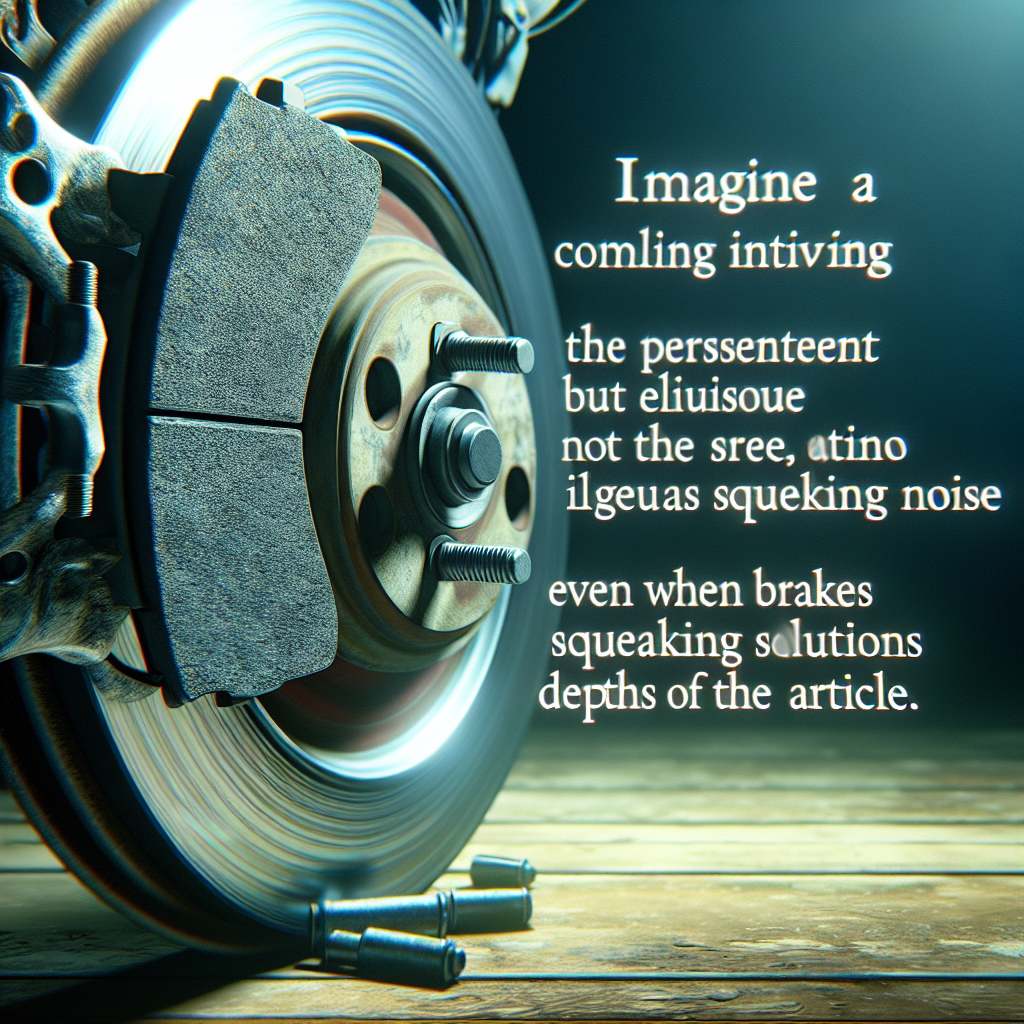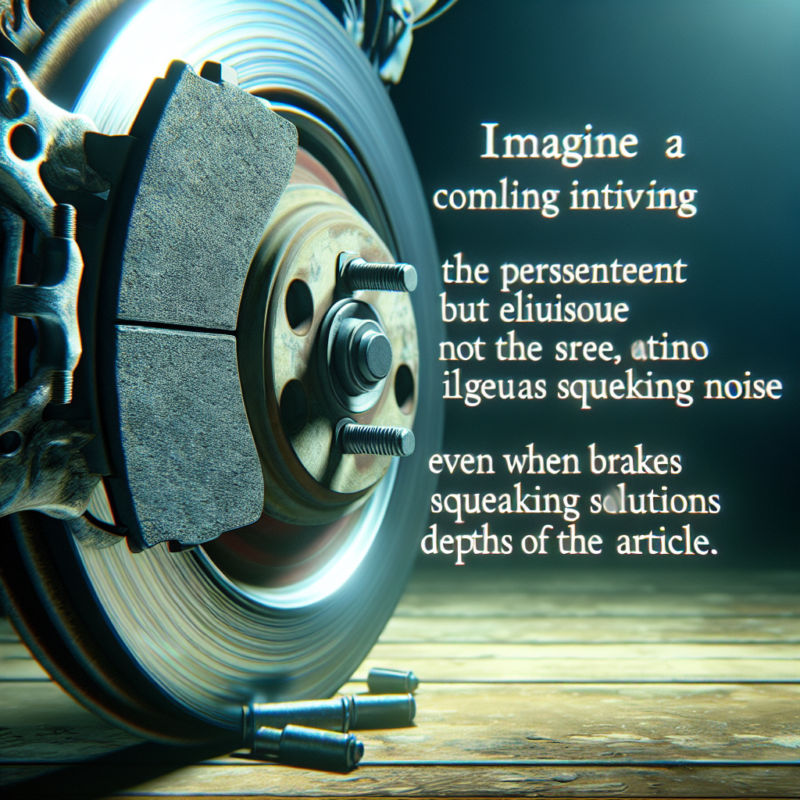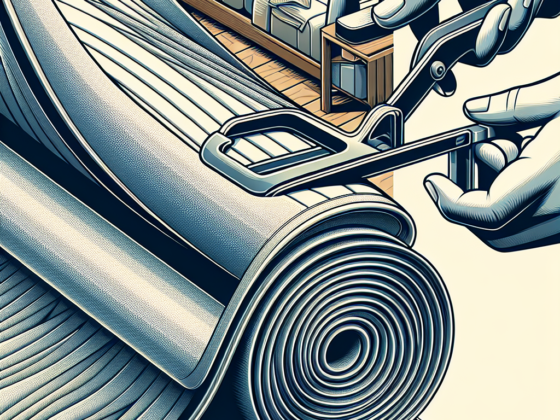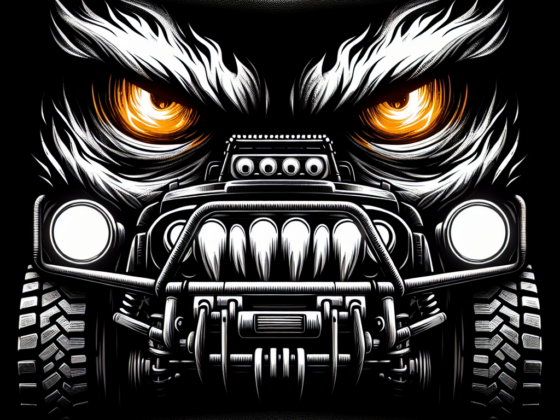Is that mysterious squeaking noise driving you crazy when you’re on the road, but you haven’t even touched the brakes? Don’t worry, you’re not alone! Many drivers have experienced this perplexing issue, and it can be quite bothersome. In this article, we’ll explore the possible reasons behind that squeaking noise and provide you with some helpful tips to address and solve the problem. So, sit back, relax, and let’s get to the bottom of this puzzling noise together!
Understanding Car Sounds
When it comes to understanding car noises, it is essential to differentiate between the various types of sounds your vehicle may produce. Identifying these sounds and their causes can help you address any potential issues with your car and ensure its optimal performance. In this article, we will explore different types of car noises and focus specifically on the squeaking noise while driving, even when the brakes are not applied.
Exploring Common Car Noises
Before delving into the specifics of the squeaking noise, it’s important to understand some other common car noises you may encounter. These noises can vary in terms of their causes and severity, but recognizing them can provide valuable insights into your vehicle’s condition.
Grinding Noise
A grinding noise typically indicates a problem with the braking system. It may suggest worn-out brake pads, a damaged rotor, or even a malfunctioning caliper. If you hear a grinding noise while driving, it’s crucial to have your brakes inspected immediately to avoid potential safety hazards.
Clicking or Ticking Noise
Clicking or ticking noises often stem from issues within the engine compartment. Potential causes may include a faulty valve lifter, worn-out camshaft lobes, or even low engine oil. Ignoring these sounds could lead to more severe engine damage, so it’s essential to address them promptly.
Humming or Groaning Noise
A humming or groaning noise is often associated with problems arising from the drivetrain or worn-out wheel bearings. These noises can indicate issues with the differential, wheel hub assembly, or CV joints. Neglecting such sounds may result in further damage and costly repairs.
Squeaking Noise When Not Braking
The focus of this article revolves around a unique car noise – a squeaking noise while driving, even without applying the brakes. This sound can be particularly frustrating and concerning. However, fret not! We will delve into its potential causes and explore effective solutions to address this issue.
Squeaking Noise While Driving But No Brakes Applied Explained
Now that we’ve honed in on the specific sound of interest, let’s start by understanding and distinguishing the squeaking sound you hear while driving, even when you’re not applying the brakes.
Distinguishing the Squeaking Sound
The squeaking noise you hear while driving can vary in terms of tone, pitch, and duration. It may resemble the sound of a rubber band being stretched or a door hinge that needs lubrication. Identifying the unique characteristics of the sound will play a crucial role in narrowing down its potential causes.
Frequency and Intensity of the Squeaking Sound
Pay close attention to the frequency and intensity of the squeaking sound. Does it occur consistently at a specific speed or only when turning the steering wheel? Notice if the sound becomes more pronounced when driving over bumps or uneven surfaces. Gathering these details will help diagnose the underlying issue more accurately.

Potential Causes of the Squeaking Noise
To address the squeaking noise while driving without applying the brakes, we need to consider several potential causes. Let’s explore some of the most common culprits behind this aggravating sound.
Worn Out or Damaged Belts
One possible cause of the squeaking noise could be worn out or damaged belts within the engine compartment. These belts, such as the serpentine belt or the timing belt, play a vital role in the proper operation of various engine components. Over time, they can become worn, cracked, or misaligned, resulting in the unpleasant squeaking sound.
Stick or Debris Caught in the Car
Sometimes, the cause of the noise can be as simple as a stick or debris caught in the undercarriage of your vehicle. As you drive, these objects can come into contact with different components, causing them to vibrate or squeak. Regular inspection and cleaning of the underbody can help prevent this issue.
Faulty Car Parts
Another possibility is the presence of faulty car parts that generate the squeaking noise. This could include worn-out suspension bushings, loose or damaged control arms, or even a malfunctioning wheel hub assembly. Identifying and rectifying these faulty parts is crucial for a quiet and smooth driving experience.
Uneven Tire Wear
Lastly, the squeaking noise might be a result of uneven tire wear. This can occur due to a lack of regular tire rotation or improper wheel alignment, causing the tires to wear unevenly. As a result, the tires may produce a squeaking noise while in contact with the road surface.
The Role of Car Belts in Producing Squeaking Noises
To dive deeper into a potential cause of the squeaking noise, let’s explore the role of car belts in your vehicle and how they can contribute to the problem.
Different Types of Car Belts
In modern vehicles, several types of belts are responsible for transferring power and enabling the operation of various components. Some common types of belts include the serpentine belt, timing belt, and accessory belt. Each serves a different purpose and requires regular inspection and maintenance.
Signs of Worn Out or Damaged Belts
One way to determine if your squeaking noise is due to worn-out or damaged belts is by inspecting their condition. Look out for signs such as cracks, fraying, or excessive wear. Belts that appear shiny or glazed may also indicate a problem. If you notice any of these signs, it’s crucial to replace the affected belts promptly.
Role of Belts in Car Operation
Car belts play a fundamental role in the proper operation of various engine components. They transmit power from the engine to components such as the alternator, water pump, power steering pump, and air conditioning compressor. Without functioning belts, these components would fail to operate efficiently, leading to potential damage and reduced performance.
How Faulty Belts Cause Squeaking Noises
When belts become worn or damaged, their ability to grip the pulleys and smoothly transfer power diminishes. As a result, the belts may slip or lose traction, producing a squeaking noise. Additionally, misaligned belts can create a similar sound. Addressing these issues promptly will help maintain the functionality of your vehicle.
How to Inspect Your Car for Squeaking Noises
To effectively address the squeaking noise while driving, it’s crucial to conduct a thorough inspection of various components in your car. Let’s go through the step-by-step process to identify the source of the noise.
Preparation Steps Before Inspection
Before starting the inspection, ensure your car is parked on a level surface, the engine is turned off, and the parking brake is engaged. It’s also advisable to have some basic tools on hand, such as a flashlight, jack stands, and a creeper.
Steps to Inspect the Car Belts
Start by opening the hood and visually inspecting the various belts, such as the serpentine belt and timing belt. Look for signs of wear, cracks, or glazing. Ensure the belts are properly tensioned and aligned. If you notice any issues, consider consulting a professional mechanic for further evaluation and potential replacement.
Steps to Inspect the Tires
Next, examine the condition of your tires. Check for uneven wear patterns, bulges, or tread damage. Uneven tire wear could contribute to the squeaking noise. If you discover any abnormalities, consult a tire professional to determine the best course of action, which may include tire rotation or replacement.
Steps to Inspect the Car Underbody
Lastly, inspect the underbody of your vehicle for any loose or hanging components. Look for objects that may have become lodged or trapped, such as sticks or debris. Ensure all parts are securely in place. If you find any loose or damaged components, consult a professional mechanic to rectify the issue.
Resolving Squeaking Noise From Worn Out or Damaged Belts
Now that you have identified worn-out or damaged belts as the potential cause of the squeaking noise while driving, taking the necessary steps to resolve the issue is paramount. Let’s explore the process for addressing this specific problem.
Determining the Type of Belt Repair Needed
The type and severity of belt damage will dictate the necessary repair method. In some cases, a simple adjustment of belt tension may be sufficient. However, if the belts show signs of irreparable damage, they may require complete replacement. Consult a professional mechanic to determine the appropriate course of action for your specific situation.
Key Steps in Belt Replacement
If belt replacement is necessary, it’s important to follow a systematic process to ensure proper installation. Start by identifying the correct replacement belt and consulting the vehicle’s manual for guidance if needed. Loosen the tension on the existing belt using the appropriate tools and remove it carefully. Install the new belt and adjust the tension according to the manufacturer’s specifications.
Precautions During Belt Replacement
When replacing belts, it’s crucial to exercise caution to prevent injury and ensure proper installation. Always disconnect the battery before starting any work, and refer to the vehicle’s manual for specific instructions. Additionally, if you’re unsure about any aspect of the replacement process, seek assistance from a professional mechanic to ensure the job is done correctly.
Addressing Squeaking Noise From Uneven Tire Wear
If the inspection reveals that uneven tire wear is the culprit behind the squeaking noise, taking appropriate measures to resolve this issue is vital. Let’s look at the steps you can take to address uneven tire wear effectively.
Signs of Uneven Tire Wear
Identifying whether your tires are experiencing uneven wear is crucial for addressing the squeaking noise. Check for signs such as excessive wear on one side of the tire, abnormal bulges or cupping, or irregular tread patterns. If you notice any of these signs, it’s time to take action.
How to Troubleshoot Uneven Tire Wear
To mitigate uneven tire wear, start by having your tires professionally aligned. Proper wheel alignment ensures that the tires make optimal contact with the road surface, preventing excessive wear. Additionally, consider rotating your tires regularly according to the manufacturer’s recommendations to distribute wear more evenly.
Steps in Tire Rotation or Replacement
If tire rotation fails to resolve the uneven wear issue, it may be necessary to replace the affected tires entirely. Consult a tire professional to determine the best course of action based on the specific wear patterns and the overall condition of your tires.
Seeking Professional Help for Squeaking Noises While Driving
While some car issues can be resolved through your own efforts, there are instances where seeking professional help is essential. Recognizing when it’s time to consult a trusted auto repair service can save you time, money, and frustrations. Let’s explore when it’s best to seek professional assistance for squeaking noises while driving.
When to Seek Professional Help
If you have performed a thorough inspection and attempted basic troubleshooting steps but are still unable to identify the cause of the squeaking noise, it’s time to seek professional help. Additionally, if you lack the necessary tools, knowledge, or experience to address certain issues, it’s best to leave it to the experts.
Choosing the Right Auto Repair Service
When selecting an auto repair service, it’s essential to consider factors such as their reputation, experience, certifications, and customer reviews. Look for service centers that specialize in addressing the specific issues you are facing, ensuring they have the necessary expertise and equipment to resolve the problem efficiently.
Expected Cost for Noise Troubleshooting and Repair
The cost of noise troubleshooting and repair can vary significantly depending on the source of the problem and the complexity of the required repairs. Factors such as the specific car model, geographic location, parts needed, and the labor required all contribute to the overall cost. Request quotes from reputable auto repair services to compare prices and choose the option that best fits your budget.
Preventive Measures to Avoid Squeaking Noise While Driving
Prevention is always better than a cure when it comes to maintaining your vehicle’s optimal performance. By following some preventive measures, you can reduce the likelihood of encountering a squeaking noise while driving. Let’s explore some proactive steps you can take.
Proper Car Maintenance Tips
Regular car maintenance is essential for preventing potential issues, including squeaking noises. Adhere to the recommended maintenance schedule outlined in your vehicle’s manual, ensuring that oil changes, filter replacements, and fluid checks are carried out at the specified intervals. Regular maintenance helps identify and address problems early on, preventing them from escalating.
Regular Inspection and Repair
In addition to scheduled maintenance, conduct routine inspections of your vehicle to identify any emerging issues. Regularly check the condition of belts, tires, suspension components, and other critical systems. Addressing any signs of wear, damage, or abnormalities promptly can prevent more significant problems in the future.
Safe Driving Practices to Minimize Wear and Damage
Practicing safe driving habits can significantly reduce the wear and tear on your vehicle’s components, potentially minimizing the occurrence of squeaking noises. Avoid sudden accelerations or decelerations, which can strain belts, cause tire slippage, or place unnecessary stress on various parts. Smooth driving and avoiding excessive speeds can also contribute to the overall longevity and health of your vehicle.
Proactive Parts Replacement
Certain vehicle parts have a limited lifespan and may require proactive replacement. This includes belts, hoses, filters, and other components. By adhering to the manufacturer’s recommended replacement intervals, you can mitigate the risk of encountering squeaking noises resulting from worn-out parts.
In conclusion, understanding car sounds is crucial for ensuring the optimal performance and safety of your vehicle. When faced with a squeaking noise while driving, even when the brakes are not applied, it’s essential to pinpoint the specific cause to take appropriate remedial action. By following the steps outlined in this article, you can effectively address the issue and enjoy a quiet and pleasant driving experience once again. Remember, when in doubt, seek professional help to ensure your vehicle remains in top shape.










